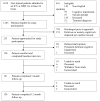A longitudinal investigation of posttraumatic stress and depressive symptoms over the course of the year following medical-surgical intensive care unit admission
- PMID: 23369507
- PMCID: PMC3644338
- DOI: 10.1016/j.genhosppsych.2012.12.005
A longitudinal investigation of posttraumatic stress and depressive symptoms over the course of the year following medical-surgical intensive care unit admission
Abstract
Objective: The objective was to identify risk factors for posttraumatic stress disorder (PTSD) and depressive symptoms after medical-surgical intensive care unit (ICU) admission.
Method: This longitudinal investigation included 150 medical-surgical ICU patients. We assessed acute stress and post-ICU PTSD symptoms with the PTSD Checklist-Civilian Version and post-ICU depressive symptoms with the Patient Health Questionnaire-9. Mixed-model linear regression ascertained associations between patient and clinical characteristics and repeated measures of post-ICU PTSD and depressive symptoms.
Results: The prevalences of substantial PTSD and depressive symptoms were 16% and 31% at 3 months post-ICU and 15% and 17% at 12 months post-ICU, respectively. In-hospital substantial acute stress symptoms [beta: 16.9, 95% confidence Interval (CI): 11.4, 22.4] were independently associated with increased post-ICU PTSD symptoms. Lifetime history of major depression (beta: 2.2, 95% CI: 0.1, 4.2), greater prior trauma exposure (beta: 0.5, 95% CI: 0.2, 0.9) and in-hospital substantial acute stress symptoms (beta: 3.5, 95% CI: 0.8, 6.2) were independently associated with increased post-ICU depressive symptoms.
Conclusions: In-hospital acute stress symptoms may represent a modifiable risk factor for psychiatric morbidity in ICU survivors. Early interventions for at-risk ICU survivors may improve longer-term psychiatric outcomes.
Copyright © 2013 Elsevier Inc. All rights reserved.
Conflict of interest statement
Figures


References
-
- Iwashyna TJ. Survivorship will be the defining challenge of critical care in the 21st century. Ann Intern Med. 2010;153:204–205. - PubMed
-
- Needham DM, Feldman DR, Kho ME. The functional costs of ICU survivorship: collaborating to improve post-ICU disability. Am J Respir Crit Care Med. 2011;183:962–964. - PubMed
Publication types
MeSH terms
Grants and funding
LinkOut - more resources
Full Text Sources
Other Literature Sources
Medical

